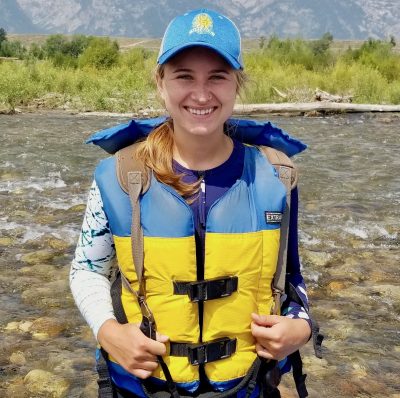Student Spotlight: Colleen Miller

August 12, 2019
Colleen Miller is a doctoral student in ecology and evolutionary biology from Green Bay, Wisconsin. After earning her bachelor’s and master’s degrees at the University of Wisconsin-Madison, she chose to attend Cornell due to its network of researchers in ecology.
What is your area of research and why is it important?
I am an ecologist and ornithologist. I study how humanized landscapes impact natural communities in our rapidly developing world focusing on climate change and urban impacts. I am currently researching how light pollution (e.g. street lamps, city lights, etc.) impacts insects and birds, concentrating on the potential effects on behavior, physiology and food-web dynamics. My dissertation focuses on the impacts of light at night on the behavior and performance of wild black-capped chickadees at feeders. I am interested both in the direct impact of constant light on birds and also indirect impacts artificial lights may have by masking the natural lunar cycle.
What are the larger implications of this research?
While many facets of our environment, such as temperature or humidity, vary over time, light cycles have never changed before. Therefore, many organisms have evolved tight relationships to celestial light. With the onset of light pollution, many wild organisms are experiencing a completely novel environment. My work will help us understand not only how artificial light at night affects animals’ physiology and behavior in our neighboring natural areas, but also give us more clarity as to how artificial light impacts the performance of wild animals within a framework including solar and lunar cycle processes.
What inspired you to choose this field of study?
I have always loved spending time out in the wilderness and with wildlife. Now that we are entering a period where landscapes are shaped by humans, I have become passionate about building a wealth of knowledge on how we effect our environment and neighboring organisms. This knowledge will hopefully help us make good management decisions in the future.
Where did you travel with your Graduate School Conference Travel Grant?
This grant allowed me to attend the American Ornithological Society’s 2019 conference in Anchorage, Alaska to give a talk on my original research entitled “Climate constrains the northerly range boundary of the Northern Cardinal”.
How important was obtaining this grant for your professional development?
In this beautiful setting, I was able to present work I have conducted on anthropogenic impacts on birds as well as connect with other researchers in my field. Because of this experience, I have been able to develop new collaborations and expand my support network in research.
What are your hobbies or interests outside of your research or scholarship?
I have too many hobbies! I love to hike, bird, and camp—getting outside is important to me. Indoors, I spend my time cooking, playing board games, and improving my new home.
Why did you choose Cornell to pursue your degree?
Cornell is home to an incredible group of researchers in ecology. My program is very supportive and empowers graduate students to be their best selves as researchers and as people. Cornell is also home to an amazing network of researchers including the world-renowned Lab of Ornithology. I have had the freedom to be very independent as a scientist here, allowing me to be creative and sharpen my everyday research skills.
